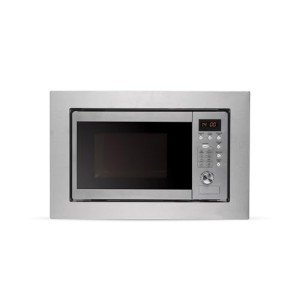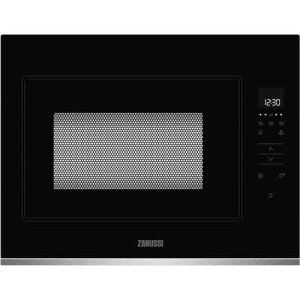Built In Microwave Over Oven Tips From The Best In The Business
페이지 정보
작성자 Robbin 댓글 0건 조회 9회 작성일 24-12-16 00:27본문
 Benefits of a Built in Microwave Over Oven
Benefits of a Built in Microwave Over Oven A built in microwave over oven helps you cook and heat food quickly and efficiently. GE provides a variety of styles, cooking technologies and control options that can be adapted to your kitchen.
A built in microwave over oven helps you cook and heat food quickly and efficiently. GE provides a variety of styles, cooking technologies and control options that can be adapted to your kitchen.Built-in microwaves are positioned behind cabinets or in recessed walls to give them a sleek and integrated look. These models require professional installation.
Space Saver
The microwave is a common appliance in the kitchen, but can also take up valuable countertop space. There are plenty of smart ways to free up countertop space by moving your microwave to an alternative place, like an island in the kitchen or recessing it into the wall.
One of the most popular options is an over-the-range (OTR) microwave. It is tucked away in a neatly placed above your stove, this model is especially beneficial in kitchens that are smaller and space is limited. Certain OTR models can also be used as an exhaust for your cooktop. This can help to reduce the amount of steam that builds up.
Another way to save space is to install a microwave with a built-in design which blends seamlessly into the cabinetry. This can give you a sleek, integrated appearance that will match your kitchen's cabinets and fixtures in color, finish, or style. It can also create a more streamlined look in your kitchen. This is ideal for homeowners who want a minimalist, uncluttered look.
Installing a built-in Microwave could require a professional installation or a kitchen remodel. Based on the layout of your home you may be able to cut a space into walls to accommodate the appliance, however, this requires adequate framing and support, which should be left to professionals. Built-in microwaves also require adequate ventilation to avoid overheating and damaging the appliance. According to Sam Cipiti of R. M. Tunis Kitchens and Baths in Chevy Chase, Maryland the minimum cabinet depth for a built-in oven is 15 inches. However some manufacturers offer trim kits that provide up to 1 1/2 inches of extra space to allow for ventilation.
A drawer-style microwave can be installed beneath your counter or within an island. This configuration is easy-to-access, suitable for all ages and requires less counter space. It can also prevent hot dishes from falling off the edge or being thrown down.
A final consideration for the space-saving Microwave Oven Built-in is the door design. Many brands offer a swing-out, drop-down or slide-out door that opens in the same motion as other kitchen appliances to help you seamlessly integrate your microwave into your cooking process. Some models also come with a sleek and smooth exterior that wards off fingerprints for better, cleaner appearance.
Convenience
A built-in microwave that is over the oven has a stylish, convenient and easy-to-clean design. In contrast to countertop models they're usually placed at eye level for easier accessibility and can be equipped with turntables that reduce the need to constantly shift food from plate to plate. In addition, built in microwaves often come with options that enhance functionality like EasyConvection oven conversion technology and a broil element that allows you to cook or brown foods.
In addition to reducing counter space, a built-in microwave that is atop an oven can increase the value of your home and appearance by offering a luxurious look that other appliances may not be able to match. If it's installed above the stove or in a separate cabinet these microwaves blend seamlessly into your kitchen for a tailored appearance that shows you've invested in your kitchen and home.
Built-in microwaves over ovens come in various sizes, power levels, and features that can be adapted to fit into any kitchen. Install them underneath the counter in a drawers to create an integrated look that can be easily black integrated microwave into existing cabinetry. This requires no additional space. These microwaves, with their luxurious finishes and high-end functions will enhance the look of your kitchen and enhance your cooking and entertaining experiences.
While the benefits of a built-in microwave over oven is obvious but keep in mind that these microwaves aren't as flexible as their freestanding counterparts. Depending on the place you install yours, it may require more space to operate than other microwaves. They are also not as portable, and you cannot easily change the model if you want something different.
If you place your microwave above your range, you'll require an extra kitchen space to accommodate the ventilation system that is required by this setup. You'll either need a ducting option that directs smoke to the outside, or a ventilator that recirculates air through the microwave and into the home. For smaller kitchens you might want to consider an additional built-in microwave which can be fitted into the wall, cabinet or island.
Convenient Controls
Microwaves have a wide range of controls, based on model. The most common features are turntables, preset functions like defrosting and reheating as well as plus-30-second buttons. Some models offer safety features for children that stop accidental use of the appliance.
Many microwaves come with pre-programmed recipes and cooking times, which make the process of cooking food faster and easier. This feature is helpful for those who are just beginning to cook and are not sure of the time needed to cook certain foods or who are unfamiliar with the specific cooking methods employed in various cuisines.
KitchenAid brand offers a wide range of built In microwaves with Grill-in and over-the-range microwaves that are designed to match the style and appearance of your other appliances for an aesthetically pleasing kitchen. Select from stainless steel and black microwave oven built in finishes that will complement any kitchen. These premium microwaves are boldly designed to bring professional-inspired styles into your home, and they're made with high-quality materials for a longer lifespan.
Contrary to countertop models built-in microwaves are fitted into a fixed space in the kitchen cabinets or walls for a sleek, custom appearance. They typically have the same components inside as countertop models, with some exceptions. These models come in a variety of sizes, including those designed to fit into a small space, and their exteriors may include a door that opens in a left-to-right swing-out or drop-down manner.
Some microwaves over the range, such as those manufactured by Whirlpool(r), can also be used as vent hoods. They have an exhaust system built in to let out fumes outside and then recirculate the air. Some microwaves come with charcoal filters that eliminate odors and moisture in your kitchen.
Countertop models are installed on the counter of the kitchen. They don't require venting or a special installation. This makes them an ideal option for people who rent their homes or stay clear of costly modifications to their kitchens. Certain models also come with trim kits to close the gap between your microwave and other freestanding countertop appliances, such as coffee pots and bread makers, as well as toaster ovens.
Energy Efficiency
Microwaves require less energy to cook water and food than other cooking methods. They also use less energy than traditional stovetop ovens because they focus the microwave's energy on the liquid inside, rather than on heating the air or other elements surrounding it. Because of this, they can heat food more quickly than a conventional oven. They can be installed in the upper or lower cabinets, and come with modern or retro styling to suit any kitchen design.
In this supplemental notification of proposed rulemaking ("SNOPR") the Office of Energy Efficiency and Renewable Energy proposes new or revised energy conservation standards for micro-wave ovens which will help consumers save money on their operating costs. The Energy Policy and Conservation Act (EPCA) requires DOE to regularly assess whether stricter standards are technologically feasible and economically justifiable and if they can result in significant energy savings.
This SNOPR contains the analyses and findings that DOE carried out to assess the impact on consumers of new or amended energy conservation standards for microwave ovens. The analysis includes a market and technology assessment, a screening analysis, an engineering analysis and national impact analysis.
The energy use analysis estimates the average annual microwave oven operating hours for households from a representative sample. This analysis is the basis of the energy savings assessments and the other consumer analyses included in this SNOPR. The analysis is made using RECS field data from various regions and considers the different usage patterns of microwave ovens across different households and the variation in the regional electricity prices.
To determine the impact of possible new or modified standards on household operating costs, DOE conducted LCC and PBP analyses to determine the lifetime cost of purchasing and using a microwave oven at different efficiency levels. The LCC and PBP calculations are built on the computer model that utilizes the Monte Carlo simulation to incorporate uncertainty and variation into the analysis.
In addition to the analysis of energy use and the LCC/PBP, this SNOPR includes an assessment of the national impact of the new or amended standards that are based on the NIA spreadsheet model. The NIA model calculates the industry's net present value ("INPV") in terms of energy savings from the potential amendment or new standards in the form of site energy savings and FFC energy savings.
댓글목록
등록된 댓글이 없습니다.